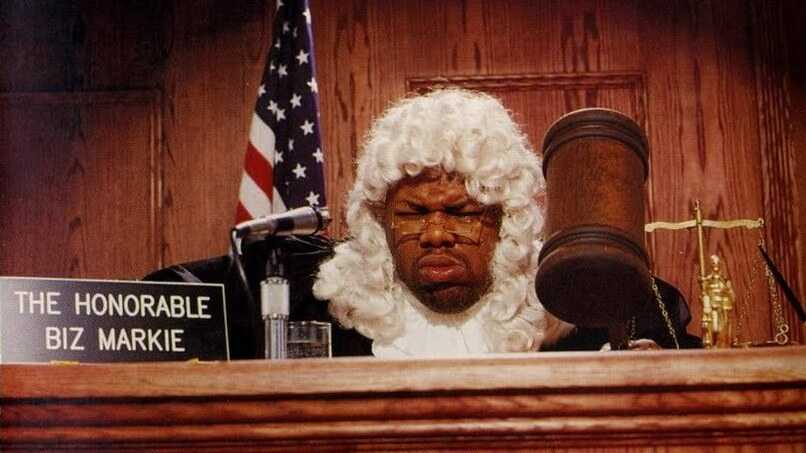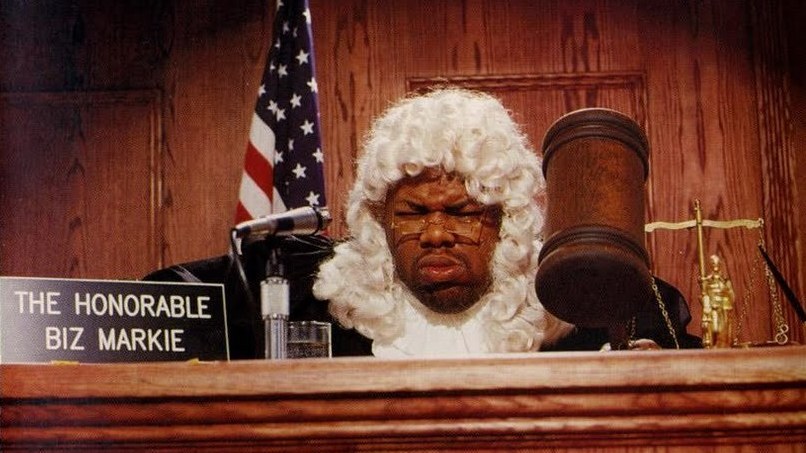Alone Again Naturally Biz Markie Sugar Ray

Biz Markie in costume in the gatefold of the LP version of All Samples Cleared! Courtesy of Cold Chillin' Records/Warner Bros. hide caption
toggle caption
Courtesy of Cold Chillin' Records/Warner Bros.

Biz Markie in costume in the gatefold of the LP version of All Samples Cleared!
Courtesy of Cold Chillin' Records/Warner Bros.
In the late 1980s, no clique in New York seemed more dominant than the Juice Crew. Assembled by producer Marley Marl, the grouping'south cadre included the larger-than-life spectacle that was Large Daddy Kane, the slippery tongued Masta Ace, the profanely prickly Roxanne Shante and the clown prince, Biz Markie. By 1993 though, the Crew'due south ascendency was on the wane, with Kane and Shante both in mid-career slumps and Ace off building a new family around him, The I.Northward.C. Every bit for Biz, he was content to exist surviving, peculiarly after two years of legal hell.
His 1993 album, All Samples Cleared!, was neither his most successful nor well-nigh critically acclaimed, but its mere existence was a triumph of sorts, with Biz waggling his famous natural language in celebration. To understand all this, we need to go dorsum a couple years, to his 1991 anthology I Need a Haircut, and, more specifically, the song "Alone Once again."
YouTube
Thematically, "Alone Once again," is like other Biz songs where he sets himself up as a "lovable loser," the kind of guy whose friends ditch him to hang out with girls or who rocks a show only to accept to walk home by himself afterwards. Musically, "Alone Again," samples several confined of the familiar piano riff from Gilbert O'Sullivan's 1972 hit, "Lonely Once more (Naturally)" and Biz sings part of O'Sullivan's hook for his own chorus (off-key, naturally). On the surface, "Lonely Again," seemed to follow a very similar template to Markie'southward biggest hit, 1989'south "But a Friend" which also riffed off a piano loop and vocal claw borrowed from Freddie Scott. Behind the scenes though, a storm began to mash.
When sampling engineering and practices became hip-hop'southward musical pattern in the belatedly 1980s, the business concern and legal rules were a thoroughly gray area. Since the techniques created digital copies of source textile, copyright holders could fence that unauthorized sampling violated their intellectual property. Those doing the sampling could debate they were repurposing fragments of recorded music to create something entirely new. Up until 1991, disputes around whose argument carried more weight tended to be settled exterior of court. This is where Biz comes back in.
In 1991, O'Sullivan sued Markie over the "Lone Again" sample. This example came hot on the heels of a $1.7 million settlement between members of '60s rock group The Turtles and the rap group De La Soul all stemming from a few seconds of a Turtles' song sampled by De La. With the O'Sullivan/Markie case, one complication was that Markie and his characterization did initially effort to clear the sample through O'Sullivan but when the singer-songwriter declined to do so, the characterization released the song anyway. This set up the eventual legal showdown which, different the previous cases, didn't get settled out-of-court but instead, ended upwards being decided by judge Kevin Duffy in a far-reaching decision for future sampling practices.

Courtesy of Cold Chillin'/Warner Bros
Duffy constitute Biz Markie guilty of infringing on O'Sullivan'south copyright, ordered the rapper to pay $250,000 in damages, barred Markie'southward label (Warner Brothers) from standing to sell either the single or album and, nearly astoundingly, referred the affair to criminal courtroom, on the grounds that Markie was liable for theft. (The rapper was never charged.) Duffy's conclusion permanently altered the landscape for sampling, not so much curtailing information technology — sampling is nonetheless popular after all — only changing the creative and business practices around information technology.
Those changes took on whatever number of unlike forms. Major labels were forced to dedicate additional staff and resources toward scouring releases to brand sure all samples had proper clearance. In fact, there's an entire shadow catalog of rap songs that went unreleased specifically because they couldn't go that clearance. Artists, peculiarly hole-and-corner producers, more oft altered recognizable lifts or sought out obscure samples in attempts to avoid detection. Either style, the "anything goes" era of sampling had substantially come up to an end.
For Biz Markie, his response to all this drama came two years later with All Samples Cleared! If the anthology'southward championship wasn't natural language-in-cheek plenty, the embrace fine art finds Markie playing both gauge and defendant, restaging the Duffy court with a smirk. On the LP version of the album, the samples are prominently, properly included on the back embrace liner notes. Notwithstanding, despite these visual gestures, Markie never explicitly addresses the lawsuit or its aftermath on the anthology's dozen songs. There are no sideways shots at Duffy or O'Sullivan, no referencing of the instance at all. On the scale of "f--- you" albums, it doesn't quite rise to the level of Marvin Gaye's Here, My Love even though the title and art obviously nod at the O'Sullivan accommodate.
There is one sample-related curiosity though. 5 of the songs — almost half the anthology — use samples based on five unlike versions of Allen Toussaint's "Get Out Of My Life Woman." The first rail, "I'thousand The Biz Markie" for example, uses The Mad Lads' cover. The side by side song, "I'm a Ugly Nigga (And then What?)" samples from Lee Dorsey's encompass. And then along.
Sonically, there's no way for a listener to miss this repeated use even if each version has its small, subtle differences (Joe Williams' embrace, used on Markie's "Funk Is Back" has a unique piano trill, for instance). Other albums use the same pulsate sounds repeatedly but this may exist the only example where an artist went to such deliberate lengths to have the same base composition and and then flip samples from so many different versions of it.
Was this some kind of additional riff on the lawsuit, a "watch me equally I sample the aforementioned song five ways because I can" gesture? Was it a cost-saving measure out, since it would have been less expensive to pay multiple clearances on the same song? Or was it merely Biz, a consummate record nerd, showing off the depth of his collection? Either way, All Samples Cleared! permit the ever-comedic rapper accept the last express mirth.
Source: https://www.npr.org/sections/therecord/2013/05/01/180375856/20-years-ago-biz-markie-got-the-last-laugh
0 Response to "Alone Again Naturally Biz Markie Sugar Ray"
Post a Comment